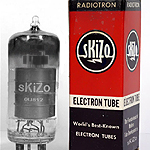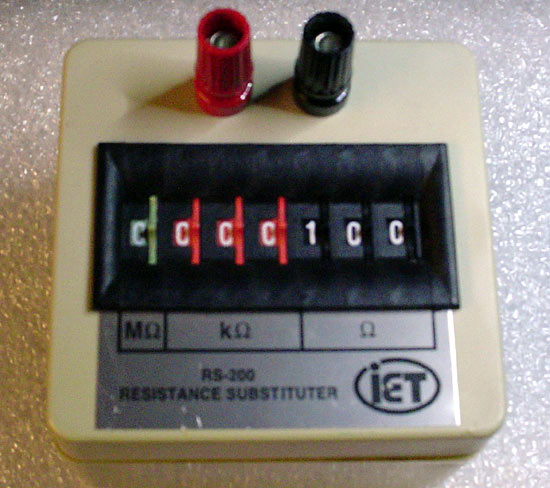+4
sailor
turbotoy
Bob Latino
audiobill
8 posters
Pin 5 Output Tube Resistor

kblsnbts- Posts : 7
Join date : 2014-11-25
- Post n°1
 Pin 5 Output Tube Resistor
Pin 5 Output Tube Resistor
I am using the VTA board with a Dyanco ST-70. Can someone please let me know the purpose of the 1K resistors connected to pin 5 of the output tubes. I'm wondering if this resistor is required to properly bias an output tube (in my case an EL34 wired as pseudo triode), or if it is strictly used as a grid stopper. I'm thinking of bypassing this resistor and want to make sure I'm not going to harm anything.

peterh- Posts : 1833
Join date : 2012-12-25
Location : gothenburg, sweden
- Post n°2
 Re: Pin 5 Output Tube Resistor
Re: Pin 5 Output Tube Resistor
This is indeed a "grid-stopper" and it's function is to prevent oscillations that might occur.kblsnbts wrote:I am using the VTA board with a Dyanco ST-70. Can someone please let me know the purpose of the 1K resistors connected to pin 5 of the output tubes. I'm wondering if this resistor is required to properly bias an output tube (in my case an EL34 wired as pseudo triode), or if it is strictly used as a grid stopper. I'm thinking of bypassing this resistor and want to make sure I'm not going to harm anything.
Removing this will only cause harm if you are unlucky, and it won't benefit in any way to
remove it.

kblsnbts- Posts : 7
Join date : 2014-11-25
- Post n°3
 Re: Pin 5 Output Tube Resistor
Re: Pin 5 Output Tube Resistor
peterh wrote:This is indeed a "grid-stopper" and it's function is to prevent oscillations that might occur.kblsnbts wrote:I am using the VTA board with a Dyanco ST-70. Can someone please let me know the purpose of the 1K resistors connected to pin 5 of the output tubes. I'm wondering if this resistor is required to properly bias an output tube (in my case an EL34 wired as pseudo triode), or if it is strictly used as a grid stopper. I'm thinking of bypassing this resistor and want to make sure I'm not going to harm anything.
Removing this will only cause harm if you are unlucky, and it won't benefit in any way to
remove it.
Thanks for the quick reply. Before submitting this post I actually bypassed the resistors and found there to be a significant improvement in the sound, but I was unsure if long term listening might damage the amplifier. If the resistors are required, I will have to experiment with different types to find the best match.

audiobill- Posts : 425
Join date : 2014-03-13
Location : Albany, NY
- Post n°4
 Re: Pin 5 Output Tube Resistor
Re: Pin 5 Output Tube Resistor
Improvement or difference?
In what ways?
In what ways?

kblsnbts- Posts : 7
Join date : 2014-11-25
- Post n°5
 Re: Pin 5 Output Tube Resistor
Re: Pin 5 Output Tube Resistor
audiobill wrote:Improvement or difference?
In what ways?
I believe it to be a significant improvement. The best way to describe it is that the sound was much more natural - more 'correct'. Throughout my listening I was struck by the fact that the music sounded 'right' - less like a recording. If you're looking for specifics, I was easily able to hear an improvement in tone and air. But it's not that the tone was more warm, or anything like that. This wasn't a false sense of warmth that makes things sound more tonal. It just sounded significantly more natural and correct. I don't know how else to describe it.

Bob Latino- Admin
- Posts : 3263
Join date : 2008-11-26
Location : Massachusetts
- Post n°6
 Re: Pin 5 Output Tube Resistor
Re: Pin 5 Output Tube Resistor
Sometimes called a "grid stopper" resistor, that 1000 ohm resistor between pins 5 and 6 is there to stop any high frequency oscillation in the bias circuit from entering that particular output tube. Pin #5 is where the negative DC bias voltage is injected into the circuit to control the output tubes. Everyone has their opinion but - if you remove this resistor you run the risk of high frequency osscillation above the audio range which you may not be able to hear BUT - if the volume level is high enough, it could take out your tweeter. Without that resistor in there, you also run the risk of RF (radio frequencies) entering the tube and being amplified. I recommend leaving that "grid stopper" resistor in for the safety of the tweeter in your speaker.
Bob
Bob

kblsnbts- Posts : 7
Join date : 2014-11-25
- Post n°7
 Re: Pin 5 Output Tube Resistor
Re: Pin 5 Output Tube Resistor
Bob Latino wrote:Sometimes called a "grid stopper" resistor, that 1000 ohm resistor between pins 5 and 6 is there to stop any high frequency oscillation in the bias circuit from entering that particular output tube. Pin #5 is where the negative DC bias voltage is injected into the circuit to control the output tubes. Everyone has their opinion but - if you remove this resistor you run the risk of high frequency osscillation above the audio range which you may not be able to hear BUT - if the volume level is high enough, it could take out your tweeter. Without that resistor in there, you also run the risk of RF (radio frequencies) entering the tube and being amplified. I recommend leaving that "grid stopper" resistor in for the safety of the tweeter in your speaker.
Bob
Hey Bob. Thanks for the explanation. That makes sense. I have two follow up questions for you, though. First, would you happen to know what frequency oscillation is blocked, or rolled of with the 1000 ohm resistor? I'm wondering if anyone has ever tried to measure this on a scope and thought about increasing or decreasing the resistor value for better protection. Second, is the output transformer on the ST-70 able to pass the damaging frequencies, or oscillations? I assume there must be bandwidth limitation in the output transformer that might provide some protection. Thanks again.

Bob Latino- Admin
- Posts : 3263
Join date : 2008-11-26
Location : Massachusetts
- Post n°8
 Re: Pin 5 Output Tube Resistor
Re: Pin 5 Output Tube Resistor
I honestly do not know at what frequency that resistor starts to roll off oscillations. I do know that the larger the resistor value, the lower the roll off begins. Dynaco chose a 1000 ohm grid stop resistor. This value is good and does not cause any roll off of the audio at any audible (to humans) frequency. Yes - the output transformers will roll off the high frequencies but will do so well above 20 Khz. The output transformers can (and will) send ultrasonic information to your tweeters. The VTA ST-70 amp is essentially flat (less than + or - .2 dB from 10 Hz to 20 KHz) and is down just 3 dB at 60 KHz. See frequency response plotted on a graph by VTA ST-70 amp customer Russell Knize. Russ has the proper test gear and was kind enough to do a full test on his VTA ST-70 amp that he built from a kit. Note also on this chart the (nearly flat) dotted line which represents phase response. An amp with excellent phase response gives more realistic soundstaging in depth and width. Accurate phase response also gives a more accurate placement of instruments and vocalists within the sound stage. The complete testing that Russ did is at the link below the graph.

VTA ST-70 testing data
For more information on grid stop resistors check out the Google link here > Google grid stop resistors
Bob

VTA ST-70 testing data
For more information on grid stop resistors check out the Google link here > Google grid stop resistors
Bob

turbotoy- Posts : 48
Join date : 2012-04-15
- Post n°9
 Re: Pin 5 Output Tube Resistor
Re: Pin 5 Output Tube Resistor
I had a M125 go into high frequency oscillation and *melt* a brand new very expensive Scanspeak tweeter diaphram in seconds. Lack of grid stoppers was not the cause, but I suppose all I'm saying is DO NOT rely on the output transformers to act as a LP filter.

sailor- Posts : 269
Join date : 2011-04-04
- Post n°10
 Re: Pin 5 Output Tube Resistor
Re: Pin 5 Output Tube Resistor
I know most of the gurus on this board prefer carbon resistors for the grid stoppers but I would try also try carbon film, metal film, tantalum, and my favorite for lack of noise and coloration the Caddock TF020 thin film resistor. At only 25PPM probably the quietest resistor you can buy but not cheap at 6.50 each. The problem with carbon resistors are they get very noisy as they age and at 50 years they are very noisy. There is a misconception that you can hear noise. The truth is in most cases you can't, noise sets the floor at which point you can hear the music. IE: the lower the noise the higher the detail. The detail is only heard if it is louder than the noise. So what you are hearing with the removal of what I would think is very noisy resistors is more detail. I use metal film 50ppm and about 20 cents and save the Caddock for my preamp.

peterh- Posts : 1833
Join date : 2012-12-25
Location : gothenburg, sweden
- Post n°11
 Re: Pin 5 Output Tube Resistor
Re: Pin 5 Output Tube Resistor
noise from resistors comes when there is a current through them. In gridstoppers there are none.
And as good high-frequency performance is wanted here , thus carbon-comp.
The value is not important, 100ohm - 1000 ohm somewhere.
One could also add 100ohm stoppers on both anode and screen taps. Especially screens.
And as good high-frequency performance is wanted here , thus carbon-comp.
The value is not important, 100ohm - 1000 ohm somewhere.
One could also add 100ohm stoppers on both anode and screen taps. Especially screens.

sailor- Posts : 269
Join date : 2011-04-04
- Post n°12
 Re: Pin 5 Output Tube Resistor
Re: Pin 5 Output Tube Resistor
I knew that is what the gurus say and understand the logic behind it, but carbon comps are all very old and in my humble opinion, noisy in there own right. Especially if they have been in a hot circuit for 50 years. Even when there is limited DC current. The bios current although very low current is present. But what I said was to try all kinds of resistors and make up your own mind. After all, the only opinion that matters is your own because you are the one who has to live with the amp. With 40 years of modifying Dynaco and other circuits I have yet to find an amp or preamp that didn't sound better after all of the carbon comps were replaced. But again, Just my 2 cents.

sKiZo- Posts : 1530
Join date : 2013-04-01
Location : Michigan USA
- Post n°13
 Re: Pin 5 Output Tube Resistor
Re: Pin 5 Output Tube Resistor
IMHO ... if you're gonna replace them, go with the best if you can afford it. I expect the reason the uber-audiophile grade components don't come stock is the price point.
As far as what value to use ... maybe replace them with some good VR's so you can fine tune the range. Problem with that is you'd need to "lift" them from the circuit to balance and adjust them properly, and do that each time to avoid any circuit interaction that could skew the results in a point to point wiring amp like these.
Or get four of these ...

Actually quite handy. Invaluable when designing my meter circuit.
As far as what value to use ... maybe replace them with some good VR's so you can fine tune the range. Problem with that is you'd need to "lift" them from the circuit to balance and adjust them properly, and do that each time to avoid any circuit interaction that could skew the results in a point to point wiring amp like these.
Or get four of these ...

Actually quite handy. Invaluable when designing my meter circuit.

zx- Posts : 205
Join date : 2011-08-05
- Post n°14
 Re: Pin 5 Output Tube Resistor
Re: Pin 5 Output Tube Resistor
zx wrote:Thanks for any an all....input,info on tube grid stoppers...input tubes an output tubes .....an how to get the best sound for my ears... .. have fun with tubes an Turkey....hehe
.After 40 years of junk Chokes giving me my B+ the what for in my Dynacos ..
An pulling them out....I ready for more,.... more... sound wise ....
you never heard the B+ in your tube amp.... an all the sweet sound of you rectifier tube... till you get the stock Chokes in theses old Dynaco...OUT..
Am thinking... your tubes are only as good as your B+ sounds..
Like A lot of thinges in Audio on paper looks like Chokes an Grid stoppers an minny others part ....give the best sound........................but still playing with tubes 2014...Nut!
Thanks for the site Bob......hoho

peterh- Posts : 1833
Join date : 2012-12-25
Location : gothenburg, sweden
- Post n°15
 Re: Pin 5 Output Tube Resistor
Re: Pin 5 Output Tube Resistor
sailor wrote:I knew that is what the gurus say and understand the logic behind it, but carbon comps are all very old and in my humble opinion, noisy in there own right. Especially if they have been in a hot circuit for 50 years. Even when there is limited DC current. The bios current although very low current is present. But what I said was to try all kinds of resistors and make up your own mind. After all, the only opinion that matters is your own because you are the one who has to live with the amp. With 40 years of modifying Dynaco and other circuits I have yet to find an amp or preamp that didn't sound better after all of the carbon comps were replaced. But again, Just my 2 cents.
Tubes are a very old technology and should be replaced with the above logic.

kblsnbts- Posts : 7
Join date : 2014-11-25
- Post n°16
 Re: Pin 5 Output Tube Resistor
Re: Pin 5 Output Tube Resistor
I bypassed the grid resistor again last night and immediately noticed an improvement in sound quality. The sound was much more natural, less veiled, and seemed more dynamic. It is not a small difference. So we can all theorize about why I might be hearing an improvement, whether it be due to resistor material, value, shape, orientation, etc., but not having a resistor there definitely IS an improvement. So this is a hot spot I'll now need to explore to find a resistor that closely matches 'no resistor'.

peterh- Posts : 1833
Join date : 2012-12-25
Location : gothenburg, sweden
- Post n°17
 Re: Pin 5 Output Tube Resistor
Re: Pin 5 Output Tube Resistor
how i is square-waves looking on a scope ? With and without gridstopper, using the speakers.

kblsnbts- Posts : 7
Join date : 2014-11-25
- Post n°18
 Re: Pin 5 Output Tube Resistor
Re: Pin 5 Output Tube Resistor
peterh wrote:how i is square-waves looking on a scope ? With and without gridstopper, using the speakers.
Unfortunately I don't have a scope, or signal generator. I can only use my ears. If anyone out there has the equipment, though, it would be interesting to see what impact removing the grid resistor has on square waves and frequency.
For those willing to assume the risk, it would also be interesting to see if you hear the same improvement I did. If you don't want to lift the resistor, I believe alligator test leads can be used to quickly bypass (keeping in mind they would add some of their own sonic character).
Please be sure to read the warning Bob posted earlier in this thread before attempting this, though. As stated earlier in this thread by Bob and others, removing this resistor has the potential to cause damage to your speaker.
